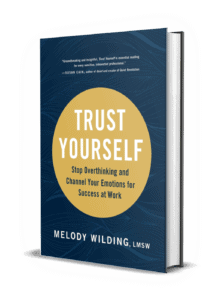Does positive thinking work?
You’ve probably had that thought if you’re trying to change your inner self-talk. After all, thinking positively sounds promising on the surface. Who wouldn’t want to think good thoughts and have everything magically work out for them?
The truth is that positive thinking doesn’t always help – or even work.
There is nothing inherently wrong with being optimistic and upbeat. But healthy positivity becomes toxic when it denies, minimizes, or invalidates a person’s emotions. You begin to start feeling bad about feeling bad.
Toxic positivity can trigger a self-defeating spiral, particularly for those who are Sensitive Strivers. As high-achievers who are also highly sensitive, they think and feel everything more deeply.
After decades of being told to “look on the bright side” and “stop taking everything so personally,” many Sensitive Strivers come to believe they are weak or broken, which can lead to chronic self-doubt, people-pleasing, overworking, and more.
The Problem With Positive Thinking
There’s no shortage of self-help gurus who swear that repeating positive phrases to yourself can change your life, encouraging that if you simply tell yourself, “I am strong and successful,” your fears will simply disappear.
The problem with positive thinking as an approach is that it operates at the surface level of conscious thoughts. It does nothing to contend with the subconscious mind where negative self-talk and limiting beliefs really live.
If you’ve tried thinking positively, you know that it can be a difficult habit to maintain. You may spend five, ten, or even twenty minutes reciting an affirmation, but the other 23 hours of the day? Chances are that your mind drifts back to old, repetitive thoughts that have burned deep grooves in your brain.
Research shows that while repeating positive self-statements may benefit people with high self-regard, it can backfire for those lacking confidence, including many Sensitive Strivers.
It goes without saying that if you command yourself to think “I am abundant and amazing,” yet your deeply held core belief is that you are never enough or unworthy of your success, your brain will be quick to incite an inner war.
Similarly, if you try to tell yourself, “I am successful,” but you struggle with imposter syndrome regarding your skills and accomplishments, your subconscious may likely remind you of the many times you’ve embarrassed yourself in front of your boss or made a mistake at work (we’ve all been there!).
The truth is that it’s natural and healthy to experience a range of feelings, including less pleasant ones like disappointment, sadness, or guilt. While there’s no question that ruminating in negative emotions is unhelpful, whitewashing your insecurities with positive thinking is merely a temporary fix.
Free BOOK CHAPTER
Turn your sensitivity into a strength and regain your confidence at work
Get exclusive access to Chapter One of my book, Trust Yourself: Stop Overthinking and Channel Your Emotions for Success at Work.
By submitting this form you consent to receive newsletters and promotions via email. Unsubscribe or opt-out any time. See our Privacy Policy.
Strategies to Reframe Negative Self-Talk
If positive thinking doesn’t work – or is even detrimental – how can you take control and mentally empower yourself to change your negative self-talk from destructive to constructive?
Since wishing and willing yourself into a success mindset won’t work, here are a few strategies to make your self-talk work for you instead of against you.
Dig Yourself Out From “Debbie Downer” Thoughts.
Start with articulating and acknowledging thoughts weighing you down – ones that don’t serve any useful purpose beyond keeping you stuck. Compassionate statements, such as, “I forgive myself for procrastinating” or “It’s okay for me to be angry,” shortcut self-bashing and free up emotional resources.
When you spend less time beating yourself up for procrastinating, you can redirect that energy into breaking down a project into manageable tasks and actually tackling your to-do list instead.
Give Interrogative Self-Talk A Try.
Research shows that asking ourselves questions rather than issuing commands is a much more effective way to create change. It’s as simple as tweaking the way you speak to yourself.
When you catch your inner critic flinging accusations, think: how can I turn this statement into a question? (see what I did there?). Asking questions opens up exploration and possibility.
Here are some examples:
- When have I successfully done this before?
- What if [insert worst-case scenario] happens? How would I handle it?
- How might I approach ____ if I was my most confident self?
This type of self-inquiry powers up the brain’s problem-solving areas, helping you tap into your innate creativity. You’re able to greet negative thoughts with curiosity instead of fear.
Focus on Progress, Not Perfection.
Using a positive affirmation like “I am wonderful and powerful” may backfire if you don’t truly, deeply believe it at both a cognitive and emotional level. To effectively re-frame your thinking, consider who you are becoming, focusing on your progress – the current track or path you’re on.
You might re-work your self-talk to sound more like “I am a work in progress, and that’s OK.” It’s pointing you in the direction of positive growth and is both realistic and achievable.
Another example: telling yourself, “Every moment I’m making an effort to be more conscious about how I react to situations,” acknowledges the fact that you are evolving and that you have a choice in creating a better future for yourself.
PRACTICE BEING WITH YOUR NEGATIVE THOUGHTS
Trying to think positively can make you want to suppress your reactions. You might tell yourself to “get over it” or “quit stressing.” You’ve probably noticed this backfires – making negative thoughts and emotions even stronger.
That’s why it’s important to improve your tolerance for ambiguity and your ability to sit with discomfort. Instead of reacting to feeling down by trying to be positive, simply let your emotions be there. Yes, uncomfortable sensations will arise. When they do, label them simply as energy in your body. Remind yourself that you’re not in danger.
One of my favorite ways to release negative thoughts is through visualization. Witness them as balloons floating away or imagine in your mind’s eye that they are leaves floating down a stream away from you. At the end of a hard day, disconnect and avoid taking work home with you by seeing your unhelpful reactions gathered in a backpack that you take off and leave in the corner of your office.
If you’re prone to negative self-talk and are sick of positive thinking that doesn’t work, try one of these re-framing techniques. You may start to notice major changes in your mindset and an uptick in your productivity and inner peace. erotic sensual massage detroit near me.
Free BOOK CHAPTER
Turn your sensitivity into a strength and regain your confidence at work
Get exclusive access to Chapter One of Trust Yourself: Stop Overthinking and Channel Your Emotions for Success at Work, on sale now, when you sign up for email updates below.
By submitting this form you consent to receive newsletters and promotions via email. Unsubscribe or opt-out any time. See our Privacy Policy.









